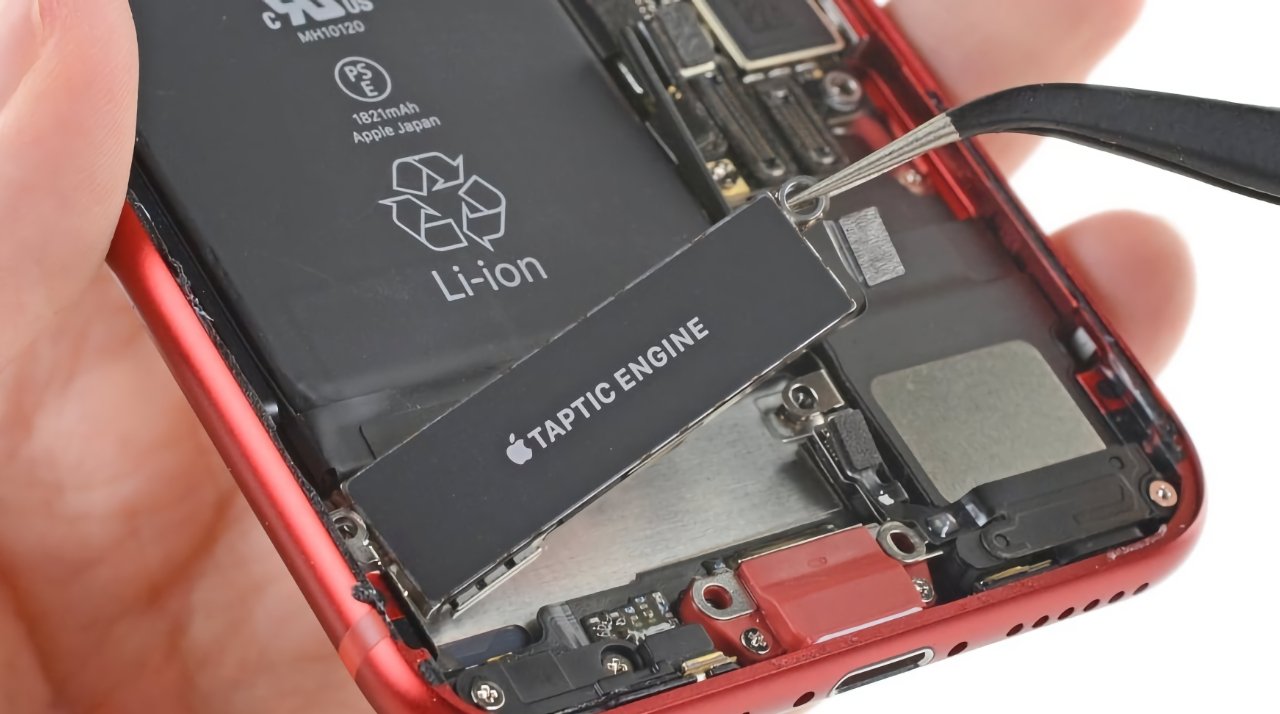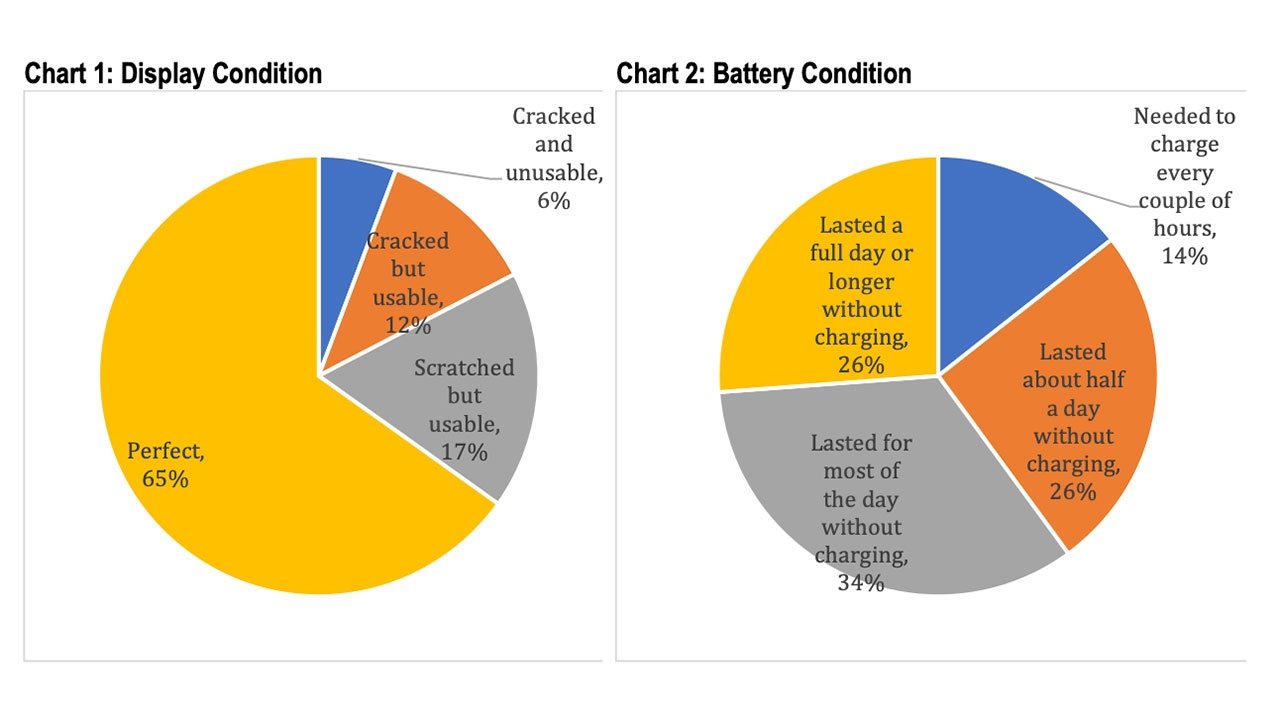Apple's Self Service Repair unlikely to impact iPhone upgrade cycle, study finds
A study published on Thursday takes a closer look at the impact Apple's new Self Service Repair might have on iPhone's average lifecycle.

Opening an iPhone SE (Source: iFixit)
Apple this week announced the Self Service Repair program, an initiative that will allow customers access to parts and tools to perform common iPhone 12 and iPhone 13 repairs like display, battery and camera replacements. The company plans to expand support to M1 Macs at a later date.
It was a surprising about-face for the tech giant, which for years has railed against the right-to-repair movement citing consumer safety and security risks.
Consumer Intelligence Research Partners delved into the implications of Apple's repair policy reversal, with a focus on how access to parts might impact sales of new iPhones. Specifically, the study takes a look at aggregate screen and battery conditions as predictors of demand for Self Service Repair, which in turn offers an indication of potential upgrade cycle disruptions.
Pulling from a survey of 2,000 U.S. Apple customers who purchased an iPhone, iPad, Mac or Apple Watch during the 12-month period ending in September, the research firm concludes that only a "small fraction" of users will use Self Service Repair to postpone a new iPhone purchase.

"Based on what consumers say about the condition of the old iPhones they are retiring, it seems that relatively few owners would use the Self Service Repair program to postpone their next iPhone purchase," said Josh Lowitz, CIRP Partner and Co-Founder. "Clearly, Apple's ongoing efforts to improve display durability and battery quality have paid off, even though consumers continue to complain, especially about battery life. Based on what consumers say about the condition of their old iPhones, most new iPhone buyers have more than adequately useable phones."
Some 6% of respondents said their iPhone screen was cracked and unusable, a condition that would necessitate replacement or repair, while 12% reported a cracked but usable display. Battery life was a more pressing issue, with 14% of owners surveyed saying their battery was depleted to the point where they needed to charge every couple of hours.
Aside from relatively long-lasting hardware, CIRP points out that iPhone owners have a number of reasons to upgrade from current hardware. Each successive iPhone iteration brings processor and camera improvements, while recent updates like iPhone 13 have increased internal storage capacities to a maximum of 1TB with iPhone 13 Pro.
Read on AppleInsider

Opening an iPhone SE (Source: iFixit)
Apple this week announced the Self Service Repair program, an initiative that will allow customers access to parts and tools to perform common iPhone 12 and iPhone 13 repairs like display, battery and camera replacements. The company plans to expand support to M1 Macs at a later date.
It was a surprising about-face for the tech giant, which for years has railed against the right-to-repair movement citing consumer safety and security risks.
Consumer Intelligence Research Partners delved into the implications of Apple's repair policy reversal, with a focus on how access to parts might impact sales of new iPhones. Specifically, the study takes a look at aggregate screen and battery conditions as predictors of demand for Self Service Repair, which in turn offers an indication of potential upgrade cycle disruptions.
Pulling from a survey of 2,000 U.S. Apple customers who purchased an iPhone, iPad, Mac or Apple Watch during the 12-month period ending in September, the research firm concludes that only a "small fraction" of users will use Self Service Repair to postpone a new iPhone purchase.

"Based on what consumers say about the condition of the old iPhones they are retiring, it seems that relatively few owners would use the Self Service Repair program to postpone their next iPhone purchase," said Josh Lowitz, CIRP Partner and Co-Founder. "Clearly, Apple's ongoing efforts to improve display durability and battery quality have paid off, even though consumers continue to complain, especially about battery life. Based on what consumers say about the condition of their old iPhones, most new iPhone buyers have more than adequately useable phones."
Some 6% of respondents said their iPhone screen was cracked and unusable, a condition that would necessitate replacement or repair, while 12% reported a cracked but usable display. Battery life was a more pressing issue, with 14% of owners surveyed saying their battery was depleted to the point where they needed to charge every couple of hours.
Aside from relatively long-lasting hardware, CIRP points out that iPhone owners have a number of reasons to upgrade from current hardware. Each successive iPhone iteration brings processor and camera improvements, while recent updates like iPhone 13 have increased internal storage capacities to a maximum of 1TB with iPhone 13 Pro.
Read on AppleInsider

Comments
I'm an engineer and I absolutely don't want to fix my own phone, car, dishwasher or laptop, etc. That doesn't sound like fun, and the time alone negates any value.
I have never needed to repair or replace anything on any of them.
So, I'm pretty indifferent about the repair thing on iPhones.
I have, however, added RAM to to my iMacs.
The money I saved buying the minimum amount of RAM and upgrading later, allowed me to max the CPU and GPU.
I am an engineer myself and used to repair laptops/desktops >2 decades ago as my job back then. Nowadays, I no longer find the needs to do so meaningfully. Devices lasted as long as its intended lifecycles (3 years for iPhones, 5 years for iPads, 5-7 years for MacBook & iMac subjected to new work requirements or use cases).
By the way, can users buy OEM parts from Samsung, HTC, Google, etc.?
Why is that hilarious to you? There are lot of poorer nations where a five and six-year-old device is what they can afford, especially in Africa and South Asia. You take the used iPhones in North America, Europe, South Korea, and Japan and you refurbish them and then sell them in Africa and South Asia.
I've installed OWC memory in 2 iMacs and a Macbook. Never had a problem. Generally I run Geekbench on devices before and after hardware or OS installations and nothing has ever been amiss.
I guess AppleInsider fans are having a field day.
And no, you're actually not allowed to buy/use Apple Care where I live and authorized resellers have ridiculous repair prices.
Not as cheap as the used iPhones that are refurbished.
Gee.....it's almost like you are proving my point here and not realizing it.
Historically, memory and hard drives are the two components that users need to upgrade. Apple traditionally overcharges for both, the prices of both tend to drop over time and the OS usage of both tends to increase with successive versions. All three of these lead to the need to upgrade them. I'm not sure if the unified memory architecture even allows for memory upgrades, but I can't think of many people who wouldn't appreciate the ability upgrade their hard drive.